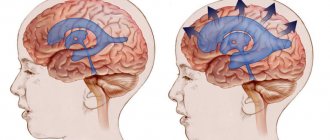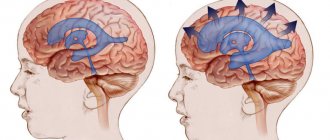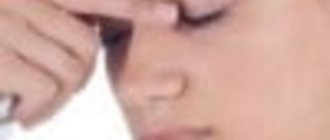Various pathological conditions of the brain are accompanied by moderate external replacement hydrocephalus of the brain. Hydrocephalus is a disease characterized by an imbalance between the production and absorption of cerebrospinal fluid. Early diagnosis and adequate treatment help improve the quality of life of the vast majority of patients with hydrocephalus. The Yusupov Hospital employs candidates and doctors of medical sciences and neurologists of the highest category. They are leading experts in the field of diseases of the central nervous system.
A comprehensive examination of patients is carried out using modern devices from leading European, American and Japanese manufacturers. Moderately severe external replacement hydrocephalus is treated with medication. Neurologists take an individual approach to the treatment of each patient, taking into account age, the cause of the disease, the degree of damage to brain tissue, and the severity of nervous function disorders. Neurosurgeons at partner clinics use innovative surgical methods for treating hydrocephalus. Patients of the Yusupov Hospital are advised by cardiologists, endocrinologists, and ophthalmologists. This approach allows us to identify the initial signs of mild external hydrocephalus and prevent the progression of the disease.
Causes of hydrocephalus
With this disease, the balance between the formation, circulation and absorption of cerebrospinal fluid is disrupted. The causes of hydrocephalus have not been fully elucidated.
Hydrocephalus in a child is usually the result of inherited genetic abnormalities and congenital disorders of the brain and spinal cord. It can also occur after premature birth, during which hemorrhage occurred in the ventricles of the newborn’s brain.
Hydrocephalus of the brain in an adult can have the following causes:
- meningitis;
- brain tumors;
- traumatic brain injury;
- subarachnoid hemorrhage;
- other conditions that impede the release of cerebrospinal fluid from the ventricles into the cisterns of the brain.
Causes and types of minor external hydrocephalus
Moderate external hydrocephalus is a disease in which the production, absorption or flow of cerebrospinal fluid along the cerebrospinal fluid pathways is impaired. Adults and children are susceptible to the disease. Minor external hydrocephalus is characterized by compression and deterioration of blood supply to the brain, which reduces its functional activity. The disease is dangerous because in the initial stages of the pathological process it is asymptomatic. Patients suspect nothing and do not seek medical help. If moderate hydrocephalus is detected early, doctors prescribe medications that improve the quality of life of patients. If the disease is detected late, complications may develop that require surgery.
Moderate external hydrocephalus in children develops for the following reasons:
- infectious diseases suffered in utero;
- genetic pathology;
- birth trauma and infection of the fetus during passage through the birth canal.
The cause of moderate external hydrocephalus in adults can be inflammatory diseases of the substance and membranes of the brain, neoplasms of the cerebellum and brain stem, cerebral atherosclerosis, arterial hypertension, and diabetes mellitus. Provoking factors are traumatic brain injuries, alcohol abuse, and intoxication.
According to the form of the disease, several types of external hydrocephalus are distinguished:
- moderate open external hydrocephalus of the brain - characterized by impaired absorption of cerebrospinal fluid, but the spaces in which the cerebrospinal fluid is located communicate freely;
- closed hydrocephalus – develops when the patency of the cerebrospinal fluid passages is disrupted by space-occupying formations or adhesions;
- External replacement hydrocephalus of the brain is a separate form of the disease in which the space vacated due to brain atrophy is filled with cerebrospinal fluid.
Replacement hydrocephalus is dangerous because it is asymptomatic for a long time.
Classification of the disease
There are three main forms of pathology:
- occlusive hydrocephalus, or internal, is a condition in which fluid does not flow from the ventricles, while the space around the brain is compressed;
- non-occlusive hydrocephalus, or external - fluid can enter from the ventricles into the space between the brain and its membranes, while they expand and compress the nervous tissue from the outside;
- mixed hydrocephalus is a combination of several blocks of cerebrospinal fluid outflow pathways.
External replacement hydrocephalus is a severe form in which the substance of the cerebral cortex atrophies, and excess fluid takes its place. A synonym for this condition is atrophic hydrocephalus.
The disease is also divided depending on its causes into post-traumatic, post-infectious and post-hemorrhagic forms. Hydrocephalus can be progressive (active) or chronic (compensated). It is accompanied by an increase in intracranial pressure.
Shunt dependent
When discharging a child from the hospital, you must insist that the brand, model of the drainage system (shunt) and pressure level (in the case of programmable shunt models) be included in the discharge. This is vital in emergency situations (eg shunt dysfunction) and when measuring pressure if overdrainage is suspected. Each programmable shunt has its own pressure setting system!
Not all types of shunt can pass through metal detectors. The drainage system settings may fail.
Avoid overheating (baths, long exposure to the sun), hypothermia, head injuries, electromagnetic treatment. Every time a child has been exposed to intense magnetic fields, check the pressure level setting of the valve.
Do not massage the head, neck and abdomen area.
If the drainage system is not functioning well, signs of shunt dysfunction appear, which are manifested in the following symptoms: increased intracranial pressure, headaches, nausea, vomiting, decreased level of spontaneous activity.
If you have a fever in combination with other suspicious symptoms (vomiting, lethargy), immediately contact a neurologist or neurosurgeon!
Symptoms and signs of hydrocephalus
External hydrocephalus is accompanied by the following symptoms:
- a disproportionately large skull in a child, divergence of sutures, enlargement of the fontanel;
- nausea and vomiting;
- intense headache;
- decreased intelligence, memory, hearing, vision;
- drowsiness;
- speech disorders.
Moderate external hydrocephalus appears gradually, and its symptoms are often mild. Only as the disease progresses does replacement hydrocephalus occur with severe consequences:
- mental disorders;
- violation of motor functions, balance;
- disturbance of mental activity.
Hydrocephalus in adults is accompanied by the following symptoms:
- intense, untreatable headache;
- vestibular disorders;
- loss of visual fields;
- paralysis of limbs;
- lack of skin sensitivity.
Internal hydrocephalus mainly affects the structures of the cerebellum: gait is disrupted, coordination of movements is lost, handwriting becomes uneven and large.
Symptoms of hydrocephalus require urgent medical attention, as this disease can cause irreversible consequences.
Symptoms and diagnosis of minor external hydrocephalus
Moderate external hydrocephalus at the first stage of the disease may not manifest itself with clinical symptoms. With a small amount of brain matter, the body is able to independently restore fluid circulation. As the disease progresses, pressure on the brain increases and severe external hydrocephalus of the brain occurs. It manifests itself with the following symptoms:
- migraine-like headache;
- nausea and vomiting;
- visual impairment (double vision);
- weakness, increased fatigue.
An unfavorable prognostic sign of hydrocephalus is drowsiness. It occurs on the eve of increased neurological symptoms and the development of a coma. Replacement hydrocephalus is characterized by signs of dementia, impaired coordination and gait, and involuntary urination.
If the cause of moderate external hydrocephalus of the brain is congenital developmental anomalies, the disease begins to manifest itself immediately after the birth of the child: the volume of the head increases, an enhanced venous pattern is visible on the forehead and face, and the fontanel swells. Children have poor appetite, they lag behind their peers in physical and mental development, and become apathetic and inhibited.
To diagnose moderate external hydrocephalus, neurologists at the Yusupov Hospital use the following diagnostic methods:
- magnetic resonance and computed tomography;
- magnetic resonance angiography;
- ultrasound examination of the brain;
- X-ray of the brain (craniography);
- laboratory tests for the presence of viruses.
The most informative is magnetic resonance imaging. The MR picture of mild internal hydrocephalus is clearly visible, which makes it possible to determine and diagnose the disease. Magnetic resonance imaging makes it possible to distinguish a significant decrease in brain volume and the filling of the resulting space with cerebrospinal fluid, neoplasms, adhesions, and blood clots. Ultrasound examination (neurosonography) is performed on newborns and small children. In cases of hydrocephalus, craniograms show thinning of the skull bones and separation of the sutures between them. The symptom of “finger impressions” is visualized on the inner surface of the cranial vault. Hydrocephalus, caused by stenosis of the cerebral aqueduct, is accompanied by a decrease in the volume of the posterior cranial fossa on radiographs of the skull.
If there are signs of increased intracranial pressure, patients undergo a lumbar puncture and 40 ml of cerebrospinal fluid is collected, which is sent for laboratory testing. If the patient's condition temporarily improves after the procedure, this allows neurosurgeons to assume a good prognosis after surgery.
Treatment of hydrocephalus
For this disease, medications are ineffective. Hydrocephalus is treated surgically. During the operation, the doctor installs a shunt system that allows cerebrospinal fluid to flow normally from the cavities of the brain into the abdominal cavity, and less often into the heart chamber or pleural cavity. The shunt system is equipped with a valve that prevents liquid backflow.
In some patients, ventriculostomy may be used. This is an endoscopic operation during which the surgeon makes a small hole in the wall of the 3rd ventricle of the brain. The normal outflow of cerebrospinal fluid then occurs through it.
Folk remedies for hydrocephalus have limited use. You can use tinctures of mint, lemon balm, cornflower, astragalus, calamus, and buckthorn berries.
Prevention and consequences of hydrocephalus
The prognosis for this disease is difficult to determine. It largely depends on how early treatment is started and the extent of irreversible brain damage.
The consequences of hydrocephalus include delayed physical and mental development. However, with the right rehabilitation program, many children with this diagnosis can lead normal lives with minor limitations.
With a progressive form of pathology, the prognosis is unfavorable.
On the other hand, even bypass surgery is not always accompanied by complete recovery. The factors on which this depends have not been fully established.
Therefore, disease prevention is important:
- if necessary, genetic counseling for expectant mothers;
- protection against infectious diseases during pregnancy;
- prevention of traumatic brain and birth injuries;
- vaccination against pneumococcus, which protects against meningitis;
- timely diagnosis and treatment of diseases causing hydrocephalus in adults.
Why should you contact the Mama Papa Ya clinic?
The network of family clinics “Mama Papa Ya” has a wide network of branches in Moscow and other cities and offers medical services at affordable prices:
- consultation with a pediatrician to identify symptoms of pathology in the child;
- consultation with a neurologist and ophthalmologist;
- observation and rehabilitation after surgical treatment of hydrocephalus;
- accurate instrumental diagnosis of the state of the brain;
- the possibility of treating both children and adults in one clinic.
If you suspect such a pathology, we invite you to sign up for a consultation at the nearest branch by phone or on our website.
Reviews
Marina Petrovna
The doctor carefully examined my husband, prescribed an ECG and made a preliminary diagnosis. She gave recommendations on our situation and ordered additional examination. No comments so far. Financial agreements have been met.
Roakh Efim Borisovich
I am simply delighted with the doctor and the clinic. I haven't had fun in clinics for a long time. Everything went perfectly from a logistics point of view, strictly on time. I also received aesthetic pleasure both as a patient and as a person. I could communicate and this communication gave me great pleasure. My deepest bow to the ultrasound doctor.
Luzina Sofya Khamitovna
I really liked Dr. Vlasova. Pleasant and sweet woman, a good specialist. I received an answer to all my questions, the doctor gave me a lot of good advice. I was more than satisfied with the visit.
Evgeniya
We visited the “Mama Papa Ya” Clinic with our child. A consultation with a pediatric cardiologist was needed. I liked the clinic. Good service, doctors. There was no queue, everything was the same price.
Olga
I really liked the clinic. Helpful staff. I had an appointment with gynecologist E.A. Mikhailova. I was satisfied, there are more such doctors. Thank you!!!
Anonymous user
I removed a lump from Alina Sergeevna, the operation was great! Many thanks to her for her sensitive attention and approach to every detail.
Anonymous user
Today I was treated at the clinic, I was satisfied with the staff, as well as the gynecologist. Everyone treats patients with respect and attention. Many thanks to them and continued prosperity.
Iratyev V.V.
The Mama Papa Ya clinic in Lyubertsy is very good. The team is friendly and responsive. I recommend this clinic to all my friends. Thanks to all doctors and administrators. I wish the clinic prosperity and many adequate clients.
Belova E.M.
Today I had a mole removed on my face from dermatologist I.A. Kodareva. The doctor is very neat! Correct! Thanks a lot! Administrator Yulia Borshchevskaya is friendly and accurately fulfills her duties.
Anonymous user
I would like to express my gratitude to the staff of the clinic: Mom, Dad, and me. The clinic has a very friendly atmosphere, a very friendly and cheerful team and highly qualified specialists. Thank you very much! I wish your clinic prosperity.
Christina
I liked the first visit. They examined me carefully, prescribed additional examinations, and gave me good recommendations. I will continue treatment further; I liked the conditions at the clinic.
Anna
Good clinic, good doctor! Raisa Vasilievna can clearly and clearly explain what the problem is. If something is wrong, she speaks about everything directly, not in a veiled way, as other doctors sometimes do. I don’t regret that I ended up with her.









